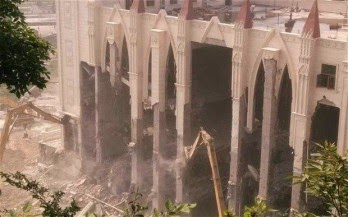Chinese authorities are cracking down on Christianity—even as China is on pace to become the world’s largest Christian nation.
On Faith
by Bob Fu
May 21, 2014
Spring is a time for new beginnings, and Easter a time to celebrate resurrection and new life. But for the long-suffering Christians of China this year, Eastertide and the weeks leading up to it have been yet another time of trials and tribulations as they face what appears to be the opening salvos of a new crackdown, triggered—at least in part—by a cityscape punctuated by too many crosses.
The tragedy that began in late February in coastal Zhejiang province and came to a head around Easter in the city of Wenzhou, one of China’s most capitalist urban centers, could very well be a test orchestrated by the central government to gauge the response, from both the church and the international community, to a new clampdown.
In early April, Christians in released an open letter telling the world that churches in various parts of the province had already been demolished, had their crosses pulled down or been ordered not to light up their crosses at night and that Wenzhou churches were also facing forced demolition. In the weeks that followed, a tense drama played out at Sanjiang Church, with determined Christians flocking to the church in an attempt to forestall demolition activity. Not surprisingly, authoritarian brute force prevailed, and by month’s end the imposing 10-year-old church building was razed.
ChinaAid‘s sources reported that by May 18, 64 Zhejiang churches had been demolished, had their crosses removed or been threatened, and that more churches in Zhejiang and neighboring Anhui province have received notifications to stop worshipping and holding Sunday school classes. The demolitions were accompanied by detentions and house arrests, which may develop into criminal charges against Christians who bravely tried to defend their rights.
Some say the tension in Zhejiang was prompted by a provincial official’s observation during his inspection tour of Wenzhou that too many crosses dominated the cityscape, especially at night.
“What do the crosses mean to the Christians?” the open letter asked. “We are definitely not worshipping a material cross, and we can even build a church without a cross, but this does not mean we should allow anyone to demolish our church’s cross at will. This is a violent trampling of one’s faith by the political power, and it is a brutal attack on the religious feelings of tens of millions of believers.”
It continued, “As is known to all, the cross is a symbol of Christian belief, and the purpose of tearing down the cross is clear and obvious.”
Even before these developments in Zhejiang, China had already earned itself the designation of a “Country of Particular Concern” in this year’s annual report by the U.S. Commission on International Religious Freedom, an independent federal advisory body. China shares that quaint designation, defined by U.S. law as “countries where particularly severe violations of religious freedom are tolerated or perpetrated” (italics mine), with just 15 other countries, including North Korea, Burma, Iran and Nigeria. In fact, it has been “a country of particular concern” for 15 years running, ever since the USCIRF was created in 1999.
From our own ChinaAid fieldwork and contacts in China, we know that the USCIRF’s conclusion is absolutely warranted. In fact, in ChinaAid’s own annual report for 2013, we have statistical documentation of worsening persecution persisting over the previous eight years. And in recent years, the target of that persecution has increasingly included the state-sanctioned “Three-Self Patriotic” churches, in addition to unofficial “house churches” that have all along borne the brunt of the atheist regime’s policies to oppress religion. In Wenzhou, Sanjiang Church and some others that were targeted were Three-Self churches.
What is worrisome is that the escalating crackdown in Zhejiang could be a harbinger of worsening persecution on a much wider scale. Although we first believed that the events in Zhejiang were limited to that province alone, secret official documents recently obtained by ChinaAid suggest that the orders for Zhejiang’s “Three Rectifications and One Demolition” campaign have come from the central government. In addition to those documents, which were dated in late February, another secret document was delivered on March 28 to a closed-door, province-wide meeting of high and mid-level officials that clearly laid out the political motivation behind the Zhejiang crackdown:
(1) Goals of our work: . . . You should . . . correct the phenomenon that religion has grown too fast, there are too many religious sites and there are too many activities, and promote the healthy, orderly, standardized and reasonable growth of the religions in our province. . . .
(2) Principles in our work: 1. . . . Cadres in charge of ethnic and religious affairs at various levels should see clearly the political issues behind the Cross.
This document leaves no doubt that China’s Communist authorities are threatened by the rapid growth of religious minorities, especially official and unofficial Protestant and Catholic churches, and that the purpose of this crackdown is to try to contain that growth. If it turns out that Zhejiang was the “experimental zone” for a nationwide crackdown, the ruling Communist Party would simply be employing a proven strategy from its old playbook. Back in the early 1980s, paramount leader Deng Xiaoping began experimenting with economic reforms in four cities designated as “special economic zones” where capitalist measures were permitted on a limited scale. As the whole world now knows, those “special economic zones” were the seeds of the phenomenal growth of China’s economy that now has worldwide impact. We pray that this latest “experimentation” does not have the same results.
Had China’s “underground church” stayed underground, this might not be happening. But the church in China that was incubated by the travails of the 1966-76 Cultural Revolution has been growing steadily since then, and in the past decade that growth has picked up speed as China’s Christians have become emboldened to live out their faith in more public ways. China’s church has actively taken to heart Jesus’ exhortations to “[not] light a candle and put it under a bushel” but rather to be “a city that is set on a hill,” and sees itself as the best vehicle for transforming China into a true civil society. Already, there is a popular saying in China: “one more Christian, one less criminal; one more church, one less prison.” In a sense, China’s Christian church is the nation’s largest non-government organization, and as is well known to all, any organization that rivals the ruling Communist Party in size and influence becomes a political target.
But recent history has shown that the church in China is so vigorous and vibrant that any attempt to contain it will only have the opposite effect. Throughout the history of Christendom, persecution has almost always led to exponential growth. China is no exception. The most recent dramatic example of that was the 1983 “Strike Hard” campaign, during which hundreds of thousands of Christians were arrested and sentenced to death or long prison terms. Paradoxically, that resulted in a major revival, to which current developments in the church in China can be traced.
Regardless of whether the Zhejiang crackdown is expanded, China is already on track to becoming the world’s largest Christian nation. Even if Beijing relaxes its hold on religion, which would lead to a slowdown in church growth, leading scholars of religion in China predict that by about 2030, China will have more Christians than any other country. If the persecution continues, the Communist Party will be in the ironic position of being “credited” with speeding up that growth and helping to realize a Christianized China even faster, according to leading sociologist Dr. Fenggang Yang of Purdue University. Either way, the prescient prediction first made by former Time magazine Beijing bureau chief David Aikman in his 2003 book Jesus in Beijing that China would become a “Christianized” nation within three decades would be proven accurate.
In all of this, the United States’ response has been disappointing, as has that of the international community as a whole. Last week, when I accompanied a group of human rights lawyers from China to a meeting with senior State Department officials, I asked when the president would appoint someone to the long-vacated post of Ambassador-at-Large for International Religious Freedom. I was told that there was not even rumor of a candidate from the White House.
In early February, President Obama told the 3,000 people who gathered for the National Prayer Breakfast, including me, that he was making global religious freedom a priority. But if three months have passed without even the hint of an appointment to his top post of diplomatic envoy for religious freedom, is it any wonder that religious persecutors from Beijing to Pyongyang to Khartoum see a “green light” to continue their persecution of religious believers? It is high time that President Obama takes some concrete steps to match his rhetoric.
In the meantime, people like my friend Pastor Jin Tianming, senior pastor of Shouwang Church, one of Beijing’s largest house churches, continue to suffer because no one is championing their case. Pastor Jin has been held under extra-judicial house arrest for more than three years because Beijing authorities refused to allow his church, which has more than 1,000 members, to rent or buy facilities for its worship services, forcing church members to meet outdoors since Easter 2011. That has resulted in the weekly arbitrary detention of multiple members for periods of hours to days, as well as the long-term house arrest of all the church’s senior leaders. In the past two Sundays, five Shouwang church members were put under administrative detention, an escalation of the punitive measures taken against Shouwang.
Unless and until the United States and the rest of the international community step up and send an unequivocal message to the Beijing leadership that this trampling of religious freedom is totally unacceptable, China’s ruling Communist Party will feel free to expand this crackdown on crosses into a nationwide campaign.
China Aid Contacts

